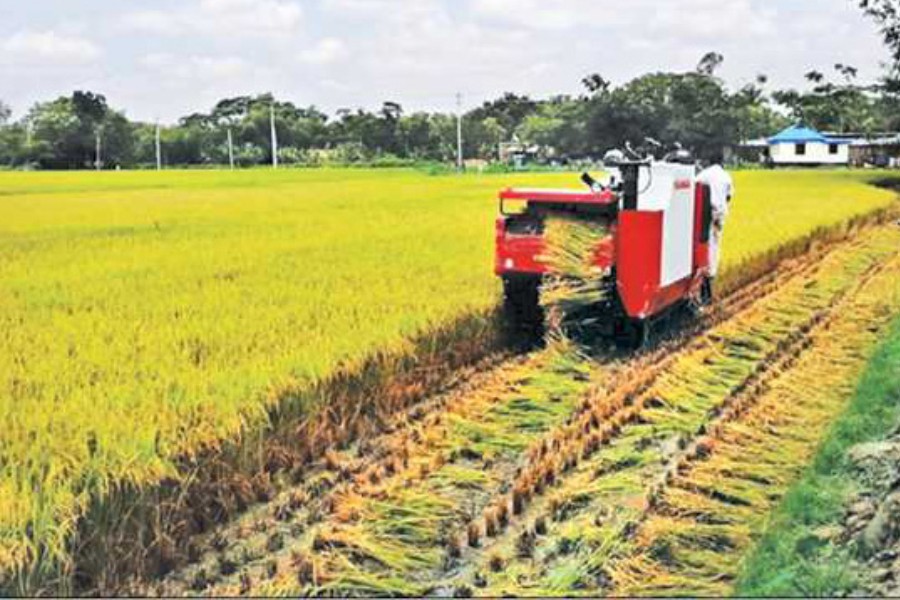
Published :
Updated :

Community-based mechanised farming reduces production cost by nearly 38 per cent from the level of expenditure witnessed in conventional labor-intensive cultivation.
Besides, it also helps produce 11 per cent more paddy per hectare of land than that in labour-intensive production.
The community-based farming yields 5.53 tonnes per hectare against the yield of 4.98 tonnes per hectare in traditional farming, suggests a research-based pilot project undertaken by the Bangladesh Academy for Rural Development (BARD).
The project findings indicate that the production cost of community-based paddy farming is Tk 542 per maund compared to Tk 874 in labour-intensive production.
The net profit in mechanised farming is Tk 30,495 per acre against Tk 10,465 in conventional farming, the findings show.
The community-based farming not only helps reduce the production cost but also ensures fare prices for the produce.
The BARD authorities are experimenting the community-based farming under the project, titled "Agricultural Mechanisation and Collective Farming through Community Enterprise".
The pilot project is now being implemented in Cumilla through joint cultivation of crops by farmers on a cooperative basis.
The project is the first of its kind undertaken by the government with an initial duration of two years.
Talking to the FE, BARD Director General (DG) Md Shahjahan said, "We have taken a research (pilot) project for joint cultivation of crops on small pieces of agricultural land (together) on a cooperative basis by the farmers for ensuring fare prices for the produce."
The project is being implemented in Noapara-Chongaon village under Kandirpar union of Laksam upazila. A total of 68 farmers are now involved with the collective farming on 50 acres of land this year.
He said more farmers expressed their interest in cultivating crops through joint farming.
Last year 42 acres of land were brought under joint cultivation, showing a growing interest of marginal farmers in cultivating crops on their small pieces of land jointly in a cooperative style, he said.
The BARD chief further said that it had been giving agriculture inputs including seeds, fertilizer and harvesters free of cost to the farmers.
He said the budget for crop cultivation in the current year was over Tk 3.8 million. Farmers cultivated Boro paddy last year and the yield was good.
He said the farmers jointly cultivated Aman paddy in the current year and the paddy would be harvested soon.
The BARD is implementing the project under joint supervision by different government ministries and departments. The farmers can sell their produce to the government directly that ensures fare prices for them.
"We will urge the government to allow us to implement our project across the country gradually, "Mr Shahjahan mentioned.
He said they recommended a three-year extension of the project for the period of 2021-2023.
The main objectives of the research project are to develop a model based on community farming to introduce a modern farming system to meet the challenges of farming mechanisation.
The prime targets of the project are to increase agricultural production and productivity through mechanisation to reduce the cost of agricultural production through collective farming practices.
Besides, it will help farmers increase income and their livelihood.
Machine-based collective agricultural management through any community enterprise farming on some small pieces of farm land helps a lot to mitigate labour shortages during the Covid-19 pandemic.
The project has helped avert water waste and aids effective pest management practices. The sectors insiders have welcomed the government initiative for joint cultivation by the farmers that will ensure fare prices.
"We welcome the government project that will help small farmers cultivate their land jointly and help get fare prices for their produce," Md Moniruzzaman, proprietor of Star Seven Consumer Industry, told the FE.
"It will also help reduce cultivation cost significantly and ensure best utilisation of small pieces of farm land," said Md Moniruzzaman, also general secretary of Bangladesh Organic Products Manufacturers Association.
The BARD is an autonomous institution that strives for research and training of local people as well as practitioners on rural development.
The academy is known for implementing the Cumilla Model in the 1960s that has been internationally recognised as a model project for rural development in developing countries.


 For all latest news, follow The Financial Express Google News channel.
For all latest news, follow The Financial Express Google News channel.